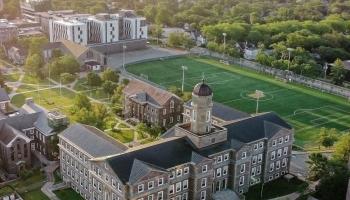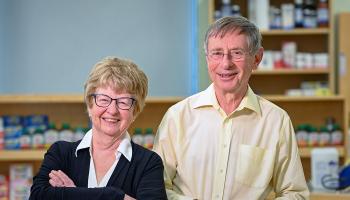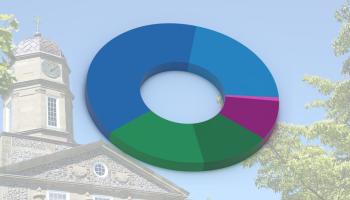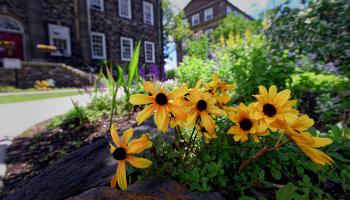Dal donors answer the call
When students experienced difficulties stemming from the COVID-19 pandemic, more than 1,000 Dalhousie donors and alumni stepped in to help.
Like the rest of the world, Dalhousie pivoted quickly in March 2020 in response to the fledgling pandemic. Remote learning and operations were facilitated wherever possible, and challenging decisions were made to try and keep the campus community as safe as possible, while everyone attempted to adapt to ‘the new normal.’
In response to the challenges our student body encountered, the university launched a crowdfunding campaign within the following month. Its goal was to help ensure students could offset some of the unanticipated financial and logistical hardships that have persisted for more than two years.
The Dalhousie community heard the call and responded in full force. Since then, more than a thousand alumni, faculty, staff, students and friends have contributed to 30 student emergency relief funds across numerous faculties and disciplines, contributing nearly $250,000.
The largest of the relief funds was the Emergency Microbursaries fund, which has helped alleviate financial hardships for 183 students from across all four of Dalhousie’s campuses.
Supporting students through challenging times
After his family in Burkina Faso experienced serious financial setbacks as a result of COVID-19, second-year civil engineering student Wilfreid Kindo struggled to handle the rising cost of housing in Halifax on top of his tuition and school materials.

Support from the Emergency Microbursaries fund helped Wilfried Kindo continue his studies during the COVID-19 pandemic. (Danny Abriel photo)
“Receiving the microbursary made a huge difference, not only on a personal level, but also on an academic level,” he says. “I am so grateful to have received this bursary and would like to express my deep gratitude to the donors, as they have massively helped students like me who are facing new, extenuating circumstances due to COVID-19.”
Kindo says he is excited to bring the knowledge and expertise he gains through his studies back home to Burkina Faso upon his graduation, intending to help improve infrastructure while honouring the traditional building methods that existed in his country pre-colonization.
“I am convinced there are innovative ways to combine and adapt modern construction design to local and environmental realities,” he says. “With my scientific background, I also believe there is a responsibility to take the environment into account in everything we do, and I strive to make sustainability the cornerstone of my career.”
Reinforcing and expanding upon classroom learnings
In addition to providing financial lifelines to Dalhousie students, other community partners did their part to ensure the student experience continued. This included adapting and maintaining co-op placements despite new restrictions and protocols, providing critical educational and networking opportunities for students.
Sara Murrin, a fourth-year chemical engineering student, says that many of her classmates struggled to find co-op placements and she worried she would encounter the same obstacle. Fortunately, as a recipient of an Irving Oil Scholarship, her co-op term proceeded as anticipated during the Fall 2020 term — with a few adjustments.

Sara Murrin says her remote co-op term helped expand upon her in-class learnings. (Submitted photo)
While the refinery and many of her colleagues were located in Saint John, N.B., Murrin was able to collaborate with them remotely from Halifax. As a result, she was able to research, analyze and make recommendations concerning important safety protocols for refinery staff members and emergency first responders.
“I created maps of potential safety hazards, to ensure that Irving Oil is prepared for every worst-case scenario,” she says. “Even though my co-op was online, I knew immediately that I was going to have a good experience because the work I was doing has real value and was used to make important decisions regarding safety.”
Murrin says she plans to remain in the energy field and credits her co-op term with enhancing her educational experience at Dalhousie — to the point where she recently began a second placement.
“My co-op term really reinforced and supported and expanded upon what I learned in class,” she says. “It helped me bridge the gaps in my understanding of chemical engineering.”
Creating connections and sharing impact
The pandemic also impacted opportunities for donors to meet and connect with recipients of student awards. While many Dalhousie faculties host annual events to allow donors to meet recipients face-to-face, perpetually shifting provincial mandates meant that large, in-person gatherings were out of the question for the better part of two years. Many faculties were forced to get creative in introducing innovative ways to create meaningful connections.
For example, the Faculty of Agriculture typically hosts an annual awards banquet where scholarship recipients share a meal with donors. In light of the circumstances, they elected to focus their efforts on setting up personal Zoom calls between students and donors, where students had the opportunity to share more about themselves and their studies. This initiative was especially meaningful for donors who live outside of the region and previously may not have been able to attend in-person events.
The Faculty of Dentistry took a similar but slightly different approach. In addition to sharing personalized thank you videos with donors, the faculty asked award recipients to provide photographs of themselves with their award letters. These images were subsequently posted on the faculty’s social media accounts providing a fun way for students to express their personalities and while voicing their gratitude in a more public manner.

Faculty of Dentistry student award recipients expressed their appreciation - and personalities - through social media posts (Submitted photo)
Although the pandemic persists and continues to send shockwaves across campus and around the world, the Dalhousie community has found ways to rally and support, encourage and make meaningful connections. In some cases, these challenges inspired new ideas to take care of each other, and to express appreciation for the many ways in which faculty, staff, students and friends support Dalhousie.









